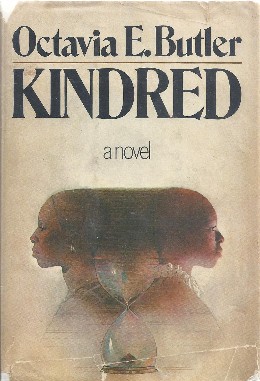My personal blog has long since been decommissioned, but I'll go ahead and share my latest Facebook status update with you: "I'm doing that weird thing where I put a lot of thought into what would be the perfect names for the kid I'll never have and don't want. Like, to the point that I'm thinking up defenses in case someone tries to argue me out of them." Yes, it's true. I have second-guessed every single major life decision I've ever made, with the exception of one: I'm very comfortable in the knowledge that I do not want children. This sometimes puts me at odds with the rest of society, not only in general, but in the specific realm of entertainment. For example, if a character reaches for a "Think of the children!" type of excuse without any other supporting motivations, I am not going to leap to their defense.
The repercussions of human reproduction are on my mind because I just wrapped up a pair of books that deal with the responsibilities we have to our offspring. Though one was a novel and one a series of essays, they both make powerful arguments for taking great care in how you handle the generations of family that surround you in time.
The fictional book was Octavia E. Butler's 1979 novel, Kindred. It's only February, but I can already tell that this is likely to land on my top five at the end of the year. The protagonist of Kindred is Dana, an African-American writer married to a white man living a fairly stable life in California in 1976. One day, Dana feels dizzy and passes out, only to find herself in Maryland just before the Civil War breaks out. She arrives just in time to save a white boy named Rufus from drowning, a white boy who will turn out to be selfish, violent, and oh yeah...her great-great-grandfather.
When she returns to 1976, barely any time has elapsed. Dana figures out that she's called to the past whenever Rufus is in mortal danger, and she returns to the present when she herself feels like she's in mortal danger. Given that she's a black woman who has landed on a Southern plantation, you can guess that danger isn't in short supply. It's really fascinating to watch her attempts to strike all the necessary delicate balances.
She must survive, but she doesn't want to be completely servile. She wants the union between Rufus and a slave girl to eventually happen, but is unhappy with his attitude towards the slaves under his family's watch. It's a really fantastic book, and a much-needed reminder that the horrors of slavery can't just be summed up in a dry recitation of facts in a high school history textbook.
The other book took a much different tack. This essay collection is called Selfish, Shallow, and Self-Absorbed: Sixteen Writers on the Decision Not to Have Kids, and was published in 2015. It's edited by Meghan Daum, and features writers from all over the society spectrum: Men and women. Gay and straight. Single and partnered. People who actively attempted to have children at one point, and people who never even wanted to try. People who agree with the monumental importance and attention that children have taken on in modern society, and people who disdain it.
It's silly that this even needs to be said up front, but it always does when the topic arises, and in fact is mentioned in the majority of the essays: None of these people hate children. They aren't bitter old cranks who sit in rocking chairs on their front porches and yell at kids to get off their lawns. What they are is very introspective and articulate about the thought processes that went into their ultimate decision to forgo the experience of raising children. While some of the authors expect a certain amount of regret to creep in as time passes, others are as sure as I am that children aren't the missing puzzle piece to a full and happy life. The essays also generally incorporate the author's fears about what sort of a parent they'd be. The idea of being responsible for the moral upbringing, physical safety, and financial security of another human being terrifies some of them, while others are fairly sure they'd be up to the challenge.
I also have to point out that it can be highly entertaining to poke fun at the foibles of parents, and the tendency of some of them - SOME of them - to be smug and condescending towards the happily child-free among us. The essayists understand this, and can be amusingly acerbic about the friends and family that assure them that they'll change their minds at some point.
If there's one issue to take with the book, it's one of necessity. Essays are written by writers, and writers are artists, and artists have a particular and specific worldview when it comes to topics like this. They generally need a lot of time to themselves and their financial situations are always precarious, so that informs a lot of the essays. I confess it would have been nice to read something with a point of view that's more universal. There are plenty of mechanics and teachers and scientists who also don't want children, so having so much revolve around the "creative process" did get a bit numbing after a while.
Still, with that said, it was an extremely interesting read, and gave me some really good insight into the many paths other people have taken to reach the same destination I have. We like your kids. Really! We'll just leave the diapers, tantrums, and expenses to you.
Kindred: A
Selfish, Shallow, and Self-Absorbed: B
Subscribe to:
Post Comments (Atom)




0 comments:
Post a Comment